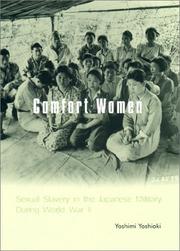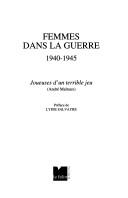| Listing 1 - 10 of 15 | << page >> |
Sort by
|

ISBN: 0471126764 Year: 1995 Publisher: New York J. Wiley
Abstract | Keywords | Export | Availability | Bookmark
 Loading...
Loading...Choose an application
- Reference Manager
- EndNote
- RefWorks (Direct export to RefWorks)
Book
ISBN: 0752477250 Year: 2012 Publisher: Stroud : The History Press,
Abstract | Keywords | Export | Availability | Bookmark
 Loading...
Loading...Choose an application
- Reference Manager
- EndNote
- RefWorks (Direct export to RefWorks)
It is the third of September 1939. It is just after half past eleven in the morning. I am fifteen years and sixteen days old. The radiogram at my home, the Woodman Hotel in Clent, has just been switched off, the silence resonates around the room, and a deathly hush has fallen. The Prime Minister, Neville Chamberlain, has declared that, despite the best efforts of the politicians of the day to secure 'peace in our time', the inevitable has befallen us; despite pledges to the contrary, Germany has invaded Poland, Hitler has ignored requests to back down and so, therefore, 'Britain is now at
Wheeler, Pamela Edith. --- Wheeler, Pamela Edith. --- Women - England - Worcestershire. --- Women -- England -- Worcestershire -- Biography. --- World War, 1939-1945 - Women - England - Worcestershire. --- World War, 1939-1945 -- Women -- England -- Worcestershire -- Biography. --- World War, 1939-1945 --- Women --- Women --- Wheeler, Pamela Edith,
Book
ISBN: 1526739461 Year: 2019 Publisher: Havertown : Pen & Sword Books Limited,
Abstract | Keywords | Export | Availability | Bookmark
 Loading...
Loading...Choose an application
- Reference Manager
- EndNote
- RefWorks (Direct export to RefWorks)
Book

ISBN: 9781785330148 Year: 2016 Publisher: New York Oxford
Abstract | Keywords | Export | Availability | Bookmark
 Loading...
Loading...Choose an application
- Reference Manager
- EndNote
- RefWorks (Direct export to RefWorks)
No detailed description available for "War and Women across Continents".
Book
ISBN: 207294029X 9782072940293 Year: 2021 Publisher: Paris: Gallimard,
Abstract | Keywords | Export | Availability | Bookmark
 Loading...
Loading...Choose an application
- Reference Manager
- EndNote
- RefWorks (Direct export to RefWorks)
Les femmes entrées en résistance de 1940 à 1944 ont longtemps été les oubliées de l'Histoire. De toutes origines et de tout âge, elles ont couru mille dangers. Certaines hébergent et sauvent les pourchassés, rédigent des journaux, confectionnent des faux papiers. D'autres espionnent, soignent les internés des camps, ravitaillent le maquis, fabriquent des explosifs. Il y a celles qui rejoignent Londres ou qui codent des messages pour la France libre. Aucune mission ne les effraie, elles montent des évasions, volent des armes, parfois les portent. Ce sont des combattantes de la liberté que la répression n'épargne pas. Nombreuses sont celles à avoir connu l'horreur de la prison et de la déportation. Grâce à de nombreuses photographies et archives inédites, l'historienne Dominique Missika redonne à ces femmes d'exception un visage et une voix.
Book
ISBN: 0691046492 0691600139 1400870976 9780691046495 0691630100 Year: 1978 Publisher: Princeton (N.J.): Princeton university press,
Abstract | Keywords | Export | Availability | Bookmark
 Loading...
Loading...Choose an application
- Reference Manager
- EndNote
- RefWorks (Direct export to RefWorks)
To discover how war can affect the status of women in industrial countries, Leila Rupp examines mobilization propaganda directed at women in Nazi Germany and the United States. Her book explores the relationship between ideology and policy, challenging the idea that wars improve the status of women by bringing them into new areas of activity. Using fresh sources for both Germany and the United States, Professor Rupp considers the images of women before and during the war, the role of propaganda in securing their support, and the ideal of feminine behavior in each country. Her analysis shows that propaganda was more intensive in the United States than in Germany, and that it figured in the success of American mobilization and the failure of the German campaign to enlist women's participation. The most important function of propaganda, however, consisted in adapting popular conceptions to economic need. The author finds that public images of women can adjust to wartime priorities without threatening traditional assumptions about social roles. The mode of adaptation, she suggests, helps to explain the lack of change in women's status in postwar society. Far-reaching in its implications for feminist studies, this book offers a new and fruitful approach to the social, economic, and political history of Germany and the United States.Originally published in 1978.The Princeton Legacy Library uses the latest print-on-demand technology to again make available previously out-of-print books from the distinguished backlist of Princeton University Press. These editions preserve the original texts of these important books while presenting them in durable paperback and hardcover editions. The goal of the Princeton Legacy Library is to vastly increase access to the rich scholarly heritage found in the thousands of books published by Princeton University Press since its founding in 1905.
Propaganda, American --- World War, 1939-1945 --- Women --- Propaganda, German. --- Propaganda, American. --- Propaganda. --- Social conditions --- Propaganda, German --- Propaganda --- Social conditions. --- German propaganda --- Pangermanism --- American propaganda --- World War, 1939-1945 - Women - United States --- World War, 1939-1945 - Propaganda --- Women - United States - Social conditions --- Women - Germany - Social conditions --- World War, 1939-1945 - Women - Germany
Book
ISSN: 19627505 ISBN: 9782713228605 2713228603 Year: 2020 Volume: 100 Publisher: Paris: Éditions de l'EHESS,
Abstract | Keywords | Export | Availability | Bookmark
 Loading...
Loading...Choose an application
- Reference Manager
- EndNote
- RefWorks (Direct export to RefWorks)
"Entre 1940 et 1945, près de 80 000 femmes quittent volontairement la France pour travailler dans les usines d’armement en Allemagne. Ces ouvrières prennent place dans un vaste système d’exploitation des étrangers, au sein duquel elles sont avant tout assignées au travail. Le couple et la maternité doivent alors être réinventés dans les détours de la ville et les marges du camp, à mille lieues de la restauration de l’ordre familial prônée par le régime de Vichy. Ce livre se penche sur la vie quotidienne de ces travailleuses françaises, à Berlin, pour montrer la façon dont la guerre et la politique de collaboration économique ont bouleversé les rapports de genre sous l’Occupation. En éclairant ces trajectoires oubliées, Camille Fauroux interroge les lacunes d’une mémoire nationale qui est toujours sélective. Mais elle explore aussi les possibilités de retrouver des histoires dissonantes, qui viennent ébranler l’apparente stabilité des relations entre hommes et femmes."
World War, 1939-1945 --- Women foreign workers --- Foreign workers, French --- Women --- War work --- History --- Guerre mondiale (1939-1945) --- Françaises --- French --- Participation des femmes. --- Travail --- Work --- Participation, Female --- Françaises --- World War, 1939-1945 - Women - France --- World War, 1939-1945 - Women - Germany --- World War, 1939-1945 - War work - Germany --- World War, 1939-1945 - War work - France --- Women foreign workers - Germany - History - 20th century --- Foreign workers, French - Germany - History - 20th century

ISBN: 9780231120326 023112032X 0231120338 9780231120333 Year: 2000 Publisher: New York: Columbia university press,
Abstract | Keywords | Export | Availability | Bookmark
 Loading...
Loading...Choose an application
- Reference Manager
- EndNote
- RefWorks (Direct export to RefWorks)
Comfort women --- World War, 1939-1945 --- Femmes de réconfort --- 2ème guerre mondiale --- Women --- Femmes --- J3385.90 --- Japan: History -- Gendai, modern -- Shōwa period -- World War II (1931-1945) -- comfort women, ianfu --- Femmes de réconfort --- 2ème guerre mondiale --- Comfort women - Asia --- World War, 1939-1945 - Women - Asia

ISBN: 2866455584 9782866455583 Year: 2004 Publisher: Paris: Le Félin,
Abstract | Keywords | Export | Availability | Bookmark
 Loading...
Loading...Choose an application
- Reference Manager
- EndNote
- RefWorks (Direct export to RefWorks)
World War, 1939-1945 --- Women in war --- 2ème guerre mondiale --- Guerre --- Women --- Underground movements --- Femmes --- Mouvements de résistance --- Participation des femmes --- 2ème guerre mondiale --- Mouvements de résistance --- World War, 1939-1945 - Underground movements - France. --- World War, 1939-1945 - Women - France.
Book
ISBN: 2035054362 9782035054364 Year: 2004 Publisher: [Paris]: Larousse,
Abstract | Keywords | Export | Availability | Bookmark
 Loading...
Loading...Choose an application
- Reference Manager
- EndNote
- RefWorks (Direct export to RefWorks)
World War, 1939-1945 --- Women in war --- Women --- 2ème guerre mondiale --- Guerre --- Femmes --- History --- Participation, Female --- Participation des femmes --- Histoire --- 2ème guerre mondiale --- Women In 2nd World War. --- World War, 1939-1945 - Women --- World War, 1939-1945 - Participation, Female --- Women - History - 20th century
| Listing 1 - 10 of 15 | << page >> |
Sort by
|

 Search
Search Feedback
Feedback About UniCat
About UniCat  Help
Help News
News